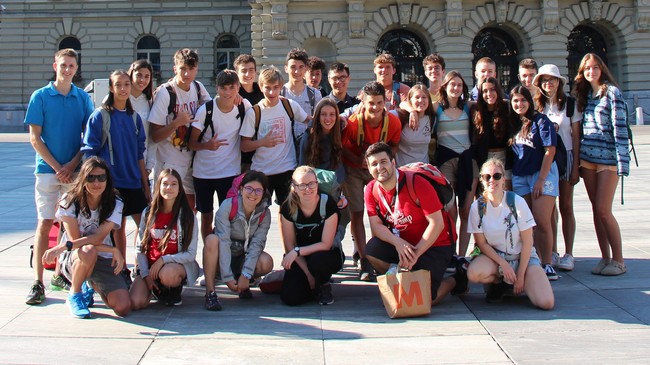
Swiss Muslims prepare for month of fasting

The Muslim holy month of Ramadan, the observance of which is marked by fasting in daylight hours, begins in Switzerland on Thursday.
The majority of Switzerland’s estimated 340,000 Muslims are believed to practise Ramadan. For many, the month is a period of contemplation but also a time for coming together.
Ramadan is the ninth month of the Islamic calendar. It traditionally begins a day after the appearance of a new moon, which is why the starting date differs depending on the geographical location.
In some parts of the Muslim world Ramadan began on Tuesday, however Swiss Muslim organisations announced it would start in Switzerland two days later.
During Ramadan, which lasts 29-30 days, Muslims are expected to give up certain activities and step up others.
“From dawn until dusk, we are not allowed to eat anything at all, we cannot drink, not even water, smoke and have sexual activity,” Ismail Amin, president of the Zurich Association of Islamic Organisations, told swissinfo.
“In this month we should also try to carry out good deeds, be a good neighbour and friend, make up with our enemies and meet other members of the Muslim community.”
However, there are some exceptions to the fasting, such as people who are ill, pregnant women, the very old and children under 12.
Fasting is not without challenges, Amin said. “The day is very long and one has to do one’s work as normal. Of course, the sense of community [in Switzerland] is not there. In the Muslim world everyone is fasting so it is a lot easier.”
Widespread practice
Although there are no official statistics, based on numbers attending prayers after breaking fast Amin believes observance of Ramadan is widespread.
This point of view is supported in academic circles. Stéphane Lathion, head of the Group of Researchers on Islam in Switzerland, says the situation in Switzerland probably reflects the rest of Europe.
“What has been noted by most researchers in Europe is that around 75-80 per cent of Muslims practise Ramadan, but as for how many are actually active Muslims, it is around 15-20 per cent maximum,” Lathion told swissinfo.
This could be explained by the fact that for some Muslims Ramadan has a cultural as well as religious importance.
“For many Muslims Ramadan is only cultural – it is perhaps the only time that some might go to the mosque – but for others it’s far more than that, because you can carry out your faith in a much more intense way than during the rest of the year,” Lathion said, adding that fasting was a personal choice, which could also explain its appeal.
Sense of community
Ramadan is also a time for families and the wider community to get together for meals after fasting or to say prayers.
Amin said that in mosques the fast was often broken communally. The end of Ramadan, the festival of Eid ul-Fitr, is celebrated with visits to the mosque and meals with family and friends.
Although Amin said he had always encountered understanding from colleagues during Ramadan, Lathion said most Swiss were unaware of the practice.
There are no particular measures in Switzerland concerning Muslim religious holidays, but Lathion said Muslims often made special arrangements with their employers or schools during Ramadan.
One such example would be stopping important school tests in the late afternoon, when fasting pupils were likely to be at their lowest ebb.
Lathion said that during these times of debate over Muslims in Switzerland such gestures or simply wishing a Muslim a good Ramadan were very much appreciated.
On Thursday Interior Minister Pascal Couchepin offered his best wishes to the country’s Muslims for Ramadan.
swissinfo, Isobel Leybold-Johnson
There are around 340,000 Muslims in Switzerland.
Almost 12% of them hold a Swiss passport.
Most of them come from the Balkans as refugees during the war in the former Yugoslavia or from Turkey.
Numbers have risen in recent years, up from 2.2% of the population in 1990 to 4.3% in 2000.
Islam is a state-recognised religion in Switzerland.
Ramadan is Muslims’ most important religious month as it is when the Koran was first revealed.
Most Muslims carry out Sawm or fasting, which is the fourth of the Five Pillars of Islam. Ramadan is also considered a time for greater spirituality, performing charitable deeds and spending time in prayer and contemplation.
During Ramadan many Muslims try to eat a large meal, suhoor, just before dawn. At dusk most Muslims will break the fast with dates and water, following the example of the Prophet Muhammad, before having a meal later.
The month of Ramadan ends with the Eid ul-Fitr festival, which is marked by visits to the mosque for prayer and gatherings with family and the community.

In compliance with the JTI standards
More: SWI swissinfo.ch certified by the Journalism Trust Initiative
















![The four-metre-long painting "Sonntag der Bergbauern" [Sunday of the Mountain Farmers, 1923-24/26] had to be removed by a crane from the German Chancellery in Berlin for the exhibition in Bern.](https://www.swissinfo.ch/content/wp-content/uploads/sites/13/2025/12/01_Pressebild_KirchnerxKirchner.jpg?ver=cb688ed5)















You can find an overview of ongoing debates with our journalists here . Please join us!
If you want to start a conversation about a topic raised in this article or want to report factual errors, email us at english@swissinfo.ch.